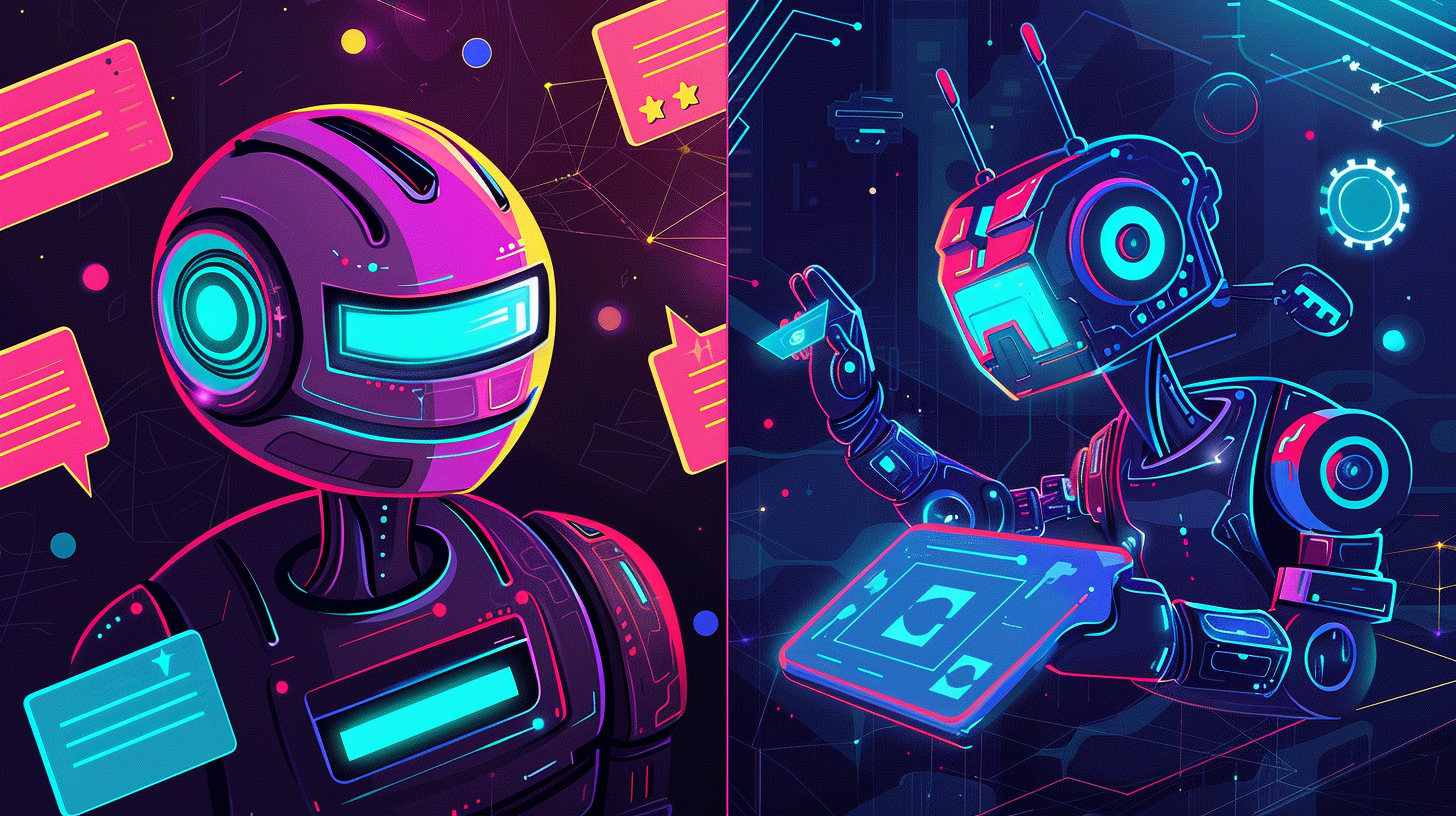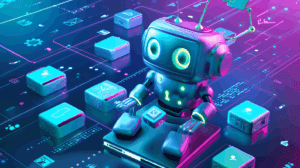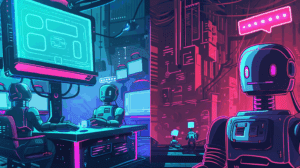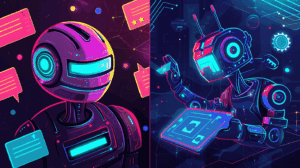Understanding AI Agents and ChatGPT
AI agents are advanced software systems designed to execute tasks autonomously, utilizing artificial intelligence to automate processes across various industries. Understanding the distinction between AI agents and tools like ChatGPT can enhance productivity strategies. They function by leveraging machine learning and data analysis to optimize efficiencies in operations ranging from customer service to financial management. For instance, platforms like Microsoft 365 Copilot and IBM’s watsonx.ai automate repetitive tasks, thereby improving productivity for businesses [Source: Mashable].
In contrast, ChatGPT is a specific iteration of AI developed by OpenAI, primarily focused on generating human-like text based on prompts it receives. It excels in natural language understanding and generation, allowing it to engage in conversational tasks, assist with content creation, and even act as a brainstorming partner [Source: The Conversation]. However, ChatGPT lacks the expansive operational capabilities that AI agents possess, which are tailored for specialized tasks such as data handling, analysis, and process automation [Source: Forbes].
The key distinction lies in their application: while AI agents manage and execute multi-faceted tasks with minimal human intervention, ChatGPT serves primarily as an assistive tool in interactive contexts. As organizations increasingly integrate both AI agents and tools like ChatGPT, understanding these differences becomes crucial for optimizing their use and enhancing overall operational efficiency. For further exploration of the transformative impact of AI, visit our article on the rise of agentic AI.
The Transformative Shift of AI Agents
AI agents represent a transformative shift in technology, enabling autonomous systems to handle tasks that were once the sole responsibility of humans. These agents can automate various functions, from scheduling and report generation in healthcare to customer service interactions in business. For example, as reported by Forbes, AI agents are evolving beyond basic diagnostic tools to complex systems capable of managing appointments and monitoring patients remotely.
The backbone of these capabilities lies in advanced technologies such as machine learning, natural language processing, and deep learning. These allow AI agents to analyze vast amounts of data, make decisions in real time, and even learn from previous interactions. For instance, platforms like IBM’s watsonx.ai are being integrated into workflows to automate processes, significantly enhancing efficiency and accuracy.
However, the rise of AI agents also introduces new challenges, particularly in the realm of cybersecurity. As noted in a piece by Technology Decisions, organizations must adapt to the unique risks that these intelligent systems pose. Ensuring that AI agents operate securely involves both safeguarding their algorithms and implementing robust oversight to prevent unauthorized access or manipulation.
In summary, AI agents are set to revolutionize numerous sectors, driven by robust technology and accompanied by significant organizational transformations. As they become more integrated into the fabric of operations, the need for secure, ethical, and efficient deployment will become increasingly critical. For more insights into the capabilities and implications of AI agents, check out our articles on real tasks AI agents are handling today and understanding agentic AI.
Fundamental Differences in Functionalities, Use Cases, and Performance Metrics
Functionalities
Traditional AI systems primarily operate based on predefined algorithms and assist in data analysis, decision-making, and automation of specific tasks. In contrast, agentic AI embodies a higher degree of autonomy, enabling it to perform complex tasks such as cross-referencing patient data, managing workflows, and initiating autonomous operations without human intervention. For example, in healthcare, traditional AI might assist with diagnosis, whereas agentic AI can autonomously schedule appointments and generate reports based on comprehensive data analysis [Source: Forbes].
Use Cases
Agentic AI is transforming various industries by providing tailored functionalities that address industry-specific challenges. In healthcare, agentic AI systems streamline patient management by handling scheduling, generating medical reports, and integrating patient data seamlessly [Source: FinTech Futures]. Similarly, in finance, agentic AI assists by consolidating data across disparate systems, offering real-time insights into banking operations [Source: FinTech Futures]. This breadth of applicability showcases how agentic AI can enhance operational efficiency far beyond traditional capabilities.
Performance Metrics
Performance evaluation of agentic AI encompasses operational speed, accuracy, and the ability to operate autonomously. Metrics such as task completion rates and user satisfaction ratings are critical for assessing their effectiveness. For instance, studies indicate that AI agents can significantly optimize workflows in organizations by automating tedious tasks [Source: Mashable]. Additionally, the integration of agentic AI in healthcare settings has shown a marked decrease in appointment scheduling errors and an increase in patient engagement [Source: HealthTech Magazine].
This comparison highlights the transformative potential of agentic AI over traditional AI, paving the way for innovative solutions across various sectors.
Deciding Between AI Agents and ChatGPT
AI agents and ChatGPT are powerful tools, but they excel in different scenarios based on their unique strengths and functionalities. AI agents are particularly effective in automating and optimizing processes, especially in environments where routine tasks need efficient handling. For instance, in industry settings, AI agents can manage supply chain logistics, optimize manufacturing processes, or analyze vast data sets to derive actionable insights. Their ability to integrate with existing software systems means they can operate autonomously and make decisions based on real-time data, leading to improved operational efficiency and quality control [Source: Agent Mode AI].
Conversely, ChatGPT excels in interactive environments, particularly in generating human-like text responses for customer service or educational support. It shines in scenarios where context-based conversation is required, such as tutoring students, assisting with writing assignments, or providing personalized customer interactions. Studies indicate that while using ChatGPT can enhance engagement and creativity in writing tasks, it may lead to a dependency that can undermine independent cognitive effort, especially highlighted in a study where participants’ reliance on AI affected their overall writing performance [Source: The Conversation].
In summary, AI agents work best in structured, data-driven environments, while ChatGPT excels in conversational contexts that require adaptability and a human touch. Businesses looking to leverage these technologies should assess their specific needs to utilize each tool effectively. For further insights into how AI agents can transform industries, visit our articles on the impact of agentic AI and time-saving AI solutions.
The Evolving Landscape of AI Interaction
The landscape of AI interaction is rapidly evolving, driven by advancements in technology that promise to reshape our experiences significantly. Key trends indicate a future where AI not only assists in routine tasks but also enhances decision-making across various industries. For instance, AI could emerge as a critical tool for addressing complex systemic challenges, particularly in sustainability, by providing real-time, high-resolution data essential for effective environmental management [Source: Forbes].
Moreover, sectors like logistics are harnessing AI-enabled systems to improve operational efficiencies and reduce costs, indicating a shift towards a more data-driven approach [Source: Precedence Research]. As intelligent systems become more integrated into platforms for personalized content delivery and interactive experiences, the demand for innovative AI applications will grow, reshaping how businesses engage with consumers [Source: TV Tech].
Looking ahead, it seems likely that our careers and daily lives will evolve alongside AI capabilities, prompting individuals to focus on uniquely human skills as AI continues to optimize roles traditionally held by humans [Source: Forbes]. Emphasizing creativity, emotional intelligence, and practical skills in fields where AI still falls short will be key in harmonizing human capabilities with technological advancements.
In summary, the future of AI interaction hints at a convergence of technology and human skills, fostering a partnership that enhances efficiency and innovation across multiple domains.
Choosing the Right AI Agent
To select the best AI agent for your needs, consider the following key points:
- Define Your Requirements: Start by assessing the specific tasks you want the AI agent to handle. For instance, if your focus is on customer service, look for agents with strong natural language processing capabilities and integration with existing customer relationship management (CRM) systems. Tools like Microsoft 365 Copilot or IBM’s watsonx.ai are designed to automate diverse office tasks, including customer interactions and financial processes [Source: Mashable].
- Integration Potential: Opt for agents that seamlessly integrate with your existing workflows and tools. Platforms like Cohere provide an all-in-one solution, simplifying automation across various business operations, making them effective for scaling tasks as your business grows [Source: Forbes].
- User-Friendliness: Choose agents that are easy to set up and use. Look for platforms that offer intuitive interfaces and support materials to minimize the learning curve for your team.
- Security Considerations: Ensure the AI agent you select complies with your organization’s security standards. As AI agents become integral to operations, they potentially introduce new cyber risks, so it’s crucial to invest in those that prioritize secure deployment and data protection [Source: Technology Decisions].
By focusing on these aspects, you can make a more informed choice that aligns with your strategic goals, enhances operational efficiency, and provides a strong return on investment. For more insights on integrating AI agents effectively, explore our articles on how AI agents streamline processes and the real tasks AI agents handle today.
Sources
- Agent Mode AI – How AI Agents Save You Time Without Taking Over Your Job
- Agent Mode AI – What Can AI Agents Actually Do? 7 Real Tasks They’re Handling Today
- Agent Mode AI – Understanding Agentic AI
- Agent Mode AI – The Rise and Impact of Agentic AI
- Agent Mode AI – The Impact of Agentic AI
- Forbes – The Amazing Ways AI Agents Will Transform Healthcare
- Forbes – How Online Businesses Are Winning Customers with AI Agents in 2025
- Forbes – AI and the Future of Sustainability: Building Intelligence for Impact
- Forbes – What Is the Future for Humans as AI Advances?
- HealthTech Magazine – How Can Rural Healthcare Organizations Benefit from AI?
- Mashable – 7 AI Agents Widely Used by Companies Right Now
- Precedence Research – AI-Enabled Fleet Management System Market
- The Conversation – Using ChatGPT Can Rot Your Brain? Not Quite
- CSO Online – IBM Combines Governance and Security Tools to Solve the AI Agent Oversight Crisis
- Technology Decisions – AI Agents: Securing the Artificial Workforce
- TV Tech – IBC2025 Launches Future Tech Hub to Highlight Emerging Technologies
- FinTech Futures – Reimagining Banking in the Age of AI
- FinTech Futures – Agentic Banking: Architecting the Single Brain
“`



